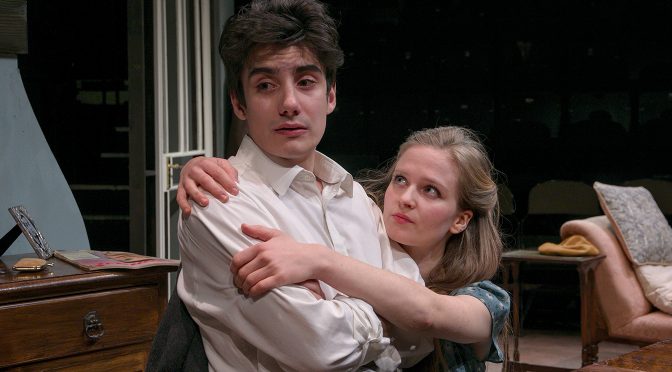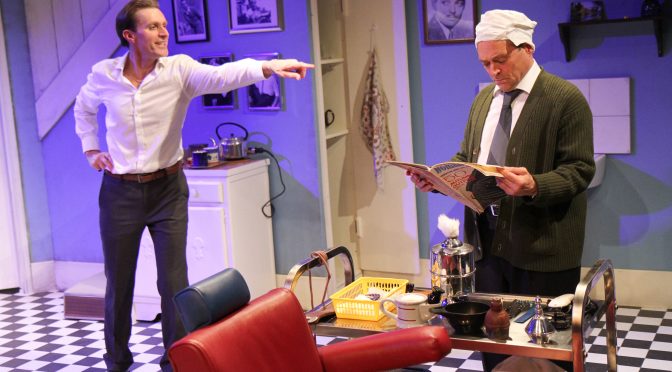A quality production adds interest to this play by Michael Hastings, despite its flaws. Written in 1956, Don’t Destroy Me is a family drama and coming-of-age story that reveals a society undergoing change. There’s plenty going on but, unfortunately, what really ends up fascinating is the young playwright’s struggles with his script.
While it is worthwhile to see kitchen-sink concerns via a working-class Jewish family the perspective isn’t elaborated on very much. And while there are interesting characters – that are well performed – it isn’t clear whose story this really is. The script lacks focus, and even strong direction from Tricia Thorns cannot add this.
There is no doubt you’ll enjoy the performance from Paul Rider as the patriarch with problems, Leo. Symbolic of his generation, he is “busted up by war”. But neither his story of immigration, his loss of faith, nor his self-medication with alcohol, are explored enough. Leo is in a loveless marriage with Shani, whose affair with her neighbour George (made superbly sinister by Timothy O’Hara) is an oddly open secret. Rider gives an emotive performance but it’s hard to feel for Leo. I wonder if Hastings disliked his creation?
Into this unhappy family arrives Leo’s son, Sammy, who has been living with his aunt. Is this our hero? The role marks a professional debut for Eddie Boyce who can be proud of their performance. But the character puzzles. We know teenagers can be tempestuous. But Sammy’s rebellion arrives too swiftly. And his loss of religion, seemingly at the moment a Rabbi he requested to meet arrives, is baffling. A lot rests on Sammy’s shoulders, and Boyce does well. But the writing isn’t strong enough. Maybe, here, Hastings was too close to his character?
Sammy isn’t the only odd one in the house. Upstairs are a mother and daughter through whom Hastings highlights mental health. Again, there’s strong work from the cast. Nell Williams plays the young Suki and makes her endearing. Alix Dunmore takes the part of her mother and works hard, carefully dropping the character’s posh voice when under stress. But the serious problems both have are handled frostily. There’s even the suggestion they’re faking. Articulacy battles with how serious these delusions are. Then Suki inexplicably transforms into a voice of wisdom for Sammy, which left me scratching my head. Both women are exaggerated so that they appear eccentric rather than troubled. Their lyrical dialogue is so laboured they become tiresome.
Considering what’s going on in this boarding house, Don’t Destroy Me should devastate any residual nostalgia for 1950s. The work might well have been shocking when it was written. But how much credit should Hastings get for that, now? The play fits neatly into a history of post-war theatre and is interesting for a social historian but is dramatically unwieldly and unrewarding. I’m grateful to have seen it, and everyone involved has done a good job. But I can’t recommend it to others.
Until 3 February 2024
Photo by Phil Gammon


